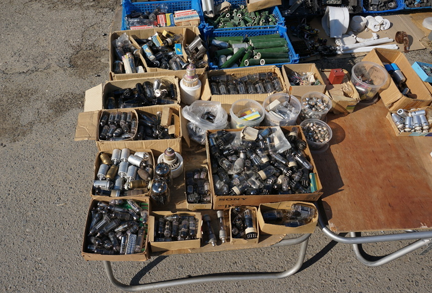We returned from Russia yesterday, but I have several half completed posts that I will try to get out over the next week or so.
We spend much of our time in Russia with a group of individuals who were refugees from the Chechen war. These individuals were from the city of Grozny and ended up in other parts of Russia with very few possessions and little assistance. Their self-reliance and success in rebuilding their lives are traits most of us cannot adequately appreciate.
While we were in Volgograd we visited various “markets”. When the intent was to secure meat, fruit or vegetables, the markets were similar to what many of us have experienced on a smaller scale as a “farmers’ market”. There were other markets. One I visited in search of a popular cup for drinking tea. This market, some might describe as a “flea market”, offered a wide variety of odds and ends. You could find plumbing supplies, bicycle or car parts, and electronic components (see image). I can fathom why someone may want a PC circuit board, but vacuum tubes? Who could possible have a device and has been searching for a specific vacuum tube to get it working again. I am guessing many folks who may read this blog have no idea what a vacuum tube is. Frankly, much of what folks were trying to sell looked like junk to me, but they must have thought there was some chance of a sale to sit all day with their goods spread out in front of them.
For whatever reason, the market made me think of makers. I have been reading about the maker culture (e.g., Chris Anderson’s Makers) and the educational potential of maker opportunities (Martinez & Stager’s Invent to learn). What I experienced in Russia was a true maker culture. People built or rebuilt their homes. They gardened at their dachas for food (and build a shelter so they could enjoy weekends out of the city). They repaired their cars. These commitments are a matter of survival.
I can appreciate past or present interests of my own that may qualify me as a maker. What I still struggle with is the notion that maker experiences can be integrated into mass education.
I think there are assumptions that have yet to be verified:
- Is there a general motivation among adolescents to commit to the deep exploration of a topic? No doubt there are interesting examples, but education requires a model that applies to all.
- Should the motivation be there, the methods and resources for developing knowledge and skills from such experiences have yet to be demonstrated.
Good idea or not, a commitment to making and tinkering is largely unproven within the masses. I wonder what we really know about the free choice activities of children – what proportion are really makers, tinkerers, even readers? Putting all this rhetoric aside, do the play a activities of adolescents really support the argument. Do most want to learn to make music or watch MTV? Do they want to program games or play games?
Someone should do a study.
Some thoughts:
- Perhaps schools are not the place for what I prefer to call “hobby learning”. This does not imply that hobbies are not valuable in developing knowledge and skill or that parents should not commit to help their children pursue hobbies.
- I still think we need a better way to think about maker activities within school settings. I like the 20% time idea taken from high tech companies of recent years. You have one day a week to work on a project of your own definition that has some potential value (I added the final part about potential value, but I think this is a useful way of explaining that the employee should be able to argue some connection between the activity and the mission of the company). As a higher ed person, I prefer the idea of “special topics” or “readings”. These are courses that a student proposes and seeks a faculty member to supervise. However, what I have observed from personal experience is that over the years fewer and fewer students seek the opportunity to develop their own topic or readings course. Opportunities of interest to some cannot be assumed to be an approach that will work for all.
9 total views , 1 views today
